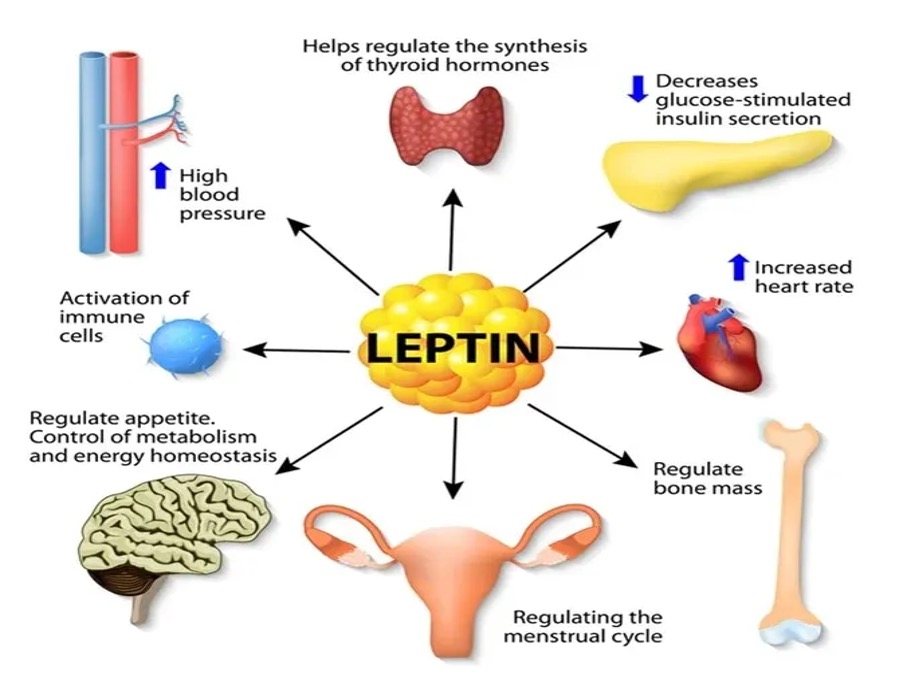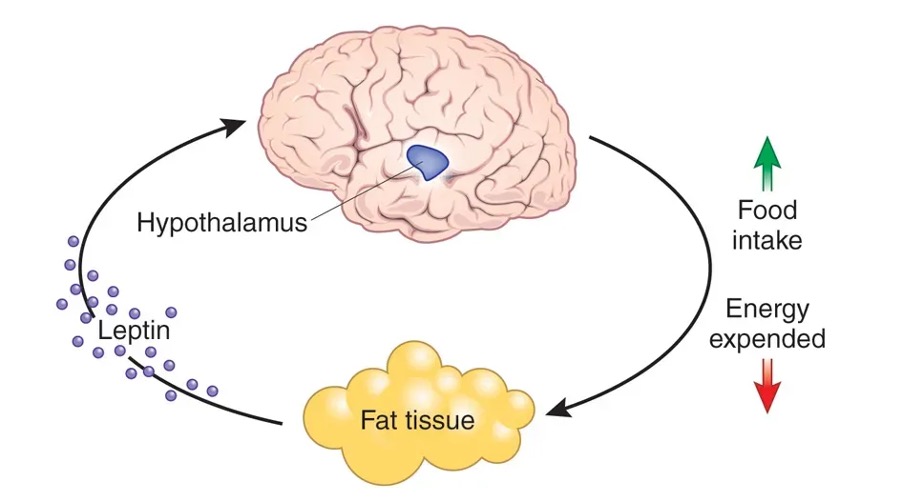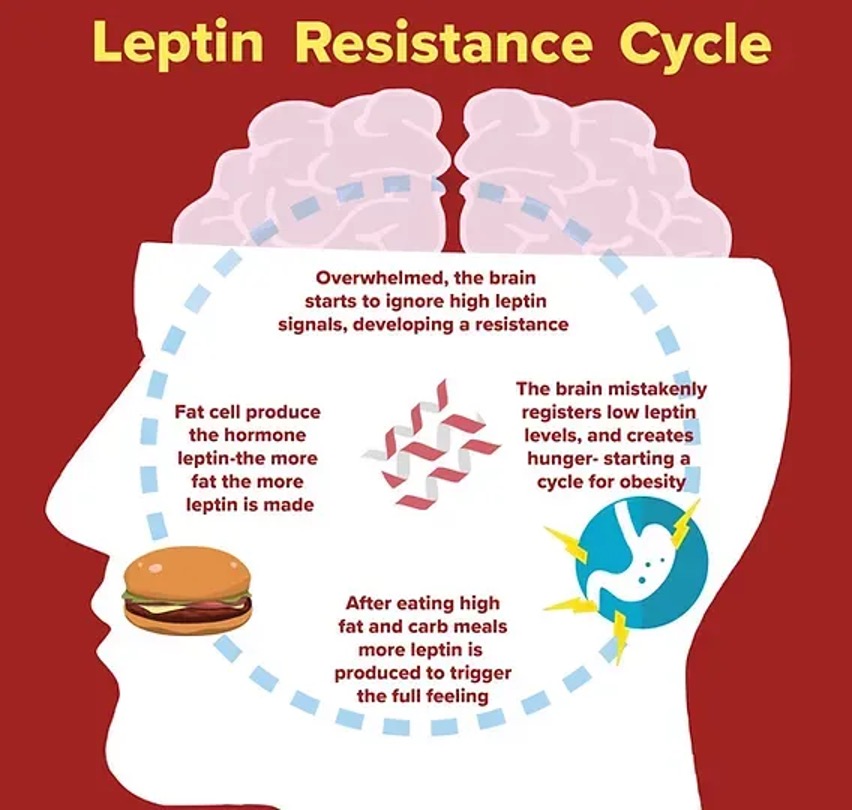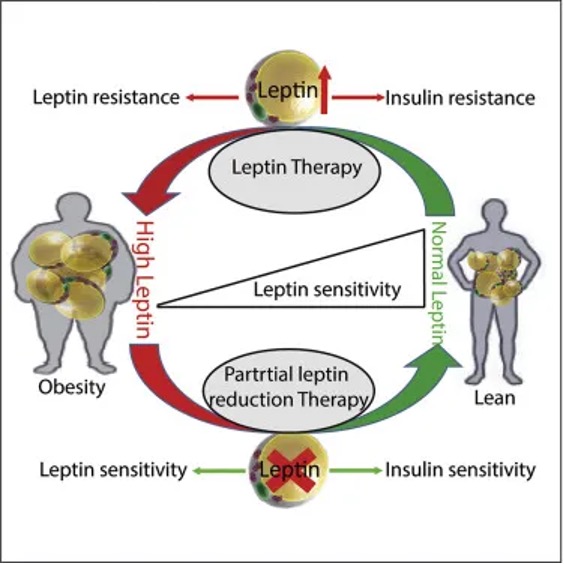
Understand leptin and understand your metabolism
Broken body clocks, damaged photoreceptors, mitochondria stuck in carb metabolism, and your nervous system is suffering. Let me quickly teach you what your endocrinologist didn’t.
Leptin is our master hormone that controls every other hormone in our body – so yeah, it’s pretty important.
Leptin is secreted from our white fat cells, and being sensitive to leptin is crucial for optimal metabolic functioning, hunger regulation, and energy balance.
Leptin is a peptide hormone, meaning that it is made from 167 amino acids (proteins). Once leptin is produced, it is secreted by white adipose tissue into the bloodstream.
Leptin plays a crucial role in fertility and reproductive health. Leptin actually affects the selection and maturation of female egg cells (oocytes) in the ovaries.
THIS IS ESSENTIAL FOR OPTIMAL FERTILISATION.

Leptin’s key role is to gather all the metabolic information (how much white fat we have on our body), and then communicate this with the brain, to tell the hypothalamus when the body has enough energy reserves.
Basically, leptin tells your brain when your body needs to stop eating.
When leptin is working optimally, and individuals are leptin sensitive, this process will usually take place at nighttime, before bed.
Leptin docks to the hypothalamus and says, “Hey Kiera’s brain, Kiera ate 12 eye fillet steaks today and now she has so much energy and so much information, she really doesn’t need any more.”
My hypothalamus then takes this information and says “Okay, I want to maintain homeostasis, so tomorrow I’m going to decrease Kiera’s hunger hormones via ghrelin, and I’m going to upregulate her metabolism in terms of her mitochondria burning off those excess calories”, (and structuring that exclusion zone water).
𝙎𝙞𝙙𝙚 𝙩𝙖𝙣𝙜𝙚𝙣𝙩: 𝙄𝙛 𝙤𝙪𝙧 𝙢𝙞𝙩𝙤𝙘𝙝𝙤𝙣𝙙𝙧𝙞𝙖 𝙖𝙧𝙚 𝙛𝙪𝙣𝙘𝙩𝙞𝙤𝙣𝙞𝙣𝙜 𝙤𝙥𝙩𝙞𝙢𝙖𝙡𝙡𝙮, 𝙘𝙖𝙡𝙤𝙧𝙞𝙚𝙨 𝙙𝙤𝙣’𝙩 𝙢𝙖𝙩𝙩𝙚𝙧 𝙗𝙚𝙘𝙖𝙪𝙨𝙚 𝙬𝙚’𝙧𝙚 𝙗𝙪𝙧𝙣𝙞𝙣𝙜 𝙩𝙝𝙖𝙩 𝙤𝙛𝙛 𝙖𝙣𝙙 𝙙𝙞𝙨𝙨𝙞𝙥𝙖𝙩𝙞𝙣𝙜 𝙞𝙩 𝙖𝙨 𝙝𝙚𝙖𝙩. 𝘽𝙪𝙩 𝙬𝙝𝙚𝙣 𝙩𝙝𝙚 𝙢𝙞𝙩𝙤𝙘𝙝𝙤𝙣𝙙𝙧𝙞𝙖 𝙗𝙚𝙘𝙤𝙢𝙚 𝙙𝙮𝙨𝙛𝙪𝙣𝙘𝙩𝙞𝙤𝙣𝙖𝙡, 𝙤𝙧 𝙬𝙝𝙚𝙣 𝙬𝙚 𝙚𝙖𝙩 𝙤𝙪𝙩 𝙤𝙛 𝙨𝙚𝙖𝙨𝙤𝙣 𝙛𝙤𝙤𝙙𝙨, 𝙥𝙧𝙤𝙗𝙡𝙚𝙢𝙨 𝙖𝙧𝙞𝙨𝙚 𝙖𝙨 𝙤𝙪𝙧 𝙤𝙪𝙧 𝙚𝙣𝙜𝙞𝙣𝙚𝙨 (𝙢𝙞𝙩𝙤𝙘𝙝𝙤𝙣𝙙𝙧𝙞𝙖) 𝙗𝙚𝙘𝙤𝙢𝙚 𝙙𝙮𝙨𝙛𝙪𝙣𝙘𝙩𝙞𝙤𝙣𝙖𝙡.

Anyway, this is what’s meant to happen if we’re LEPTIN SENSITIVE.
Leptin sensitivity or metabolic flexibility keeps our hormones working optimally, ensures our bodies are in a state of homeostasis, and helps us maintain a healthy weight.
However, when we live out of coherence with nature, leptin’s process can be disrupted, meaning that it can’t communicate with the brain. This leaves the hypothalamus to try and navigate the body’s needs without a map.
Ancestrally speaking, a food shortage was more common than a food surplus…
So when my brain doesn’t receive any information from leptin (which is derived from fat), my body doesn’t think I have any fat available as a fuel source.
This causes my brain to say:
“I have no idea what’s happening right now, so I’m just going to make Kiera extra hungry and give her all the food to ensure she’s okay and has enough energy to get through the day.”
As a consequence of this, my body is now super hungry, and I’m constantly craving carbohydrates.
This is Leptin Resistance
And it could be the cause of your weight gain, infertility, mood swings, and more.

So how do we become Leptin resistant?
Well, it actually all comes down to our modern environment.
Leptin is a classic case of ‘You’re not broken; your environment is.’
For so long, we’ve been told that it’s the food that goes into our mouths, that increases our insulin, and causes problems.
But that’s not the case.
It’s insulin being raised at nighttime (or when we’re suffering from chronic inflammation), that’s the real issue.
Because this is actually when leptin is supposed to be going to the brain (docking to the hypothalamus) and signalling fat metabolism. Remember, leptin comes from fat.
High leptin signals high adipose storage.
But the brain can’t listen to both insulin and leptin at the same time, so what happens?
When our brain is constantly given the signal of insulin, it prioritizes carbohydrate metabolism as a fuel source, and feeds your body the wrong metabolic instructions.
So when insulin is raised at night, it takes the docking station away from leptin, and leptin misses out.
This leaves us leptin resistant and unable to burn fat as a fuel source through a mismatch in signalling.

SO HOW DO WE GET RID OF INSULIN AT NIGHT, AND SUPPORT FAT BURNING?
• Don’t eat carbohydrates after sunset
• Block artificial blue light at night (yes, ALAN raises insulin via its impact on ACTH).
• Mitigate nnEMFs
• Reduce chronic stress
• Resolve any unprocessed trauma
Look out for my next substack article which explores actionable takeaways in more depth.
Overall, Leptin resistance really is a disease and pandemic of our modern environment.

